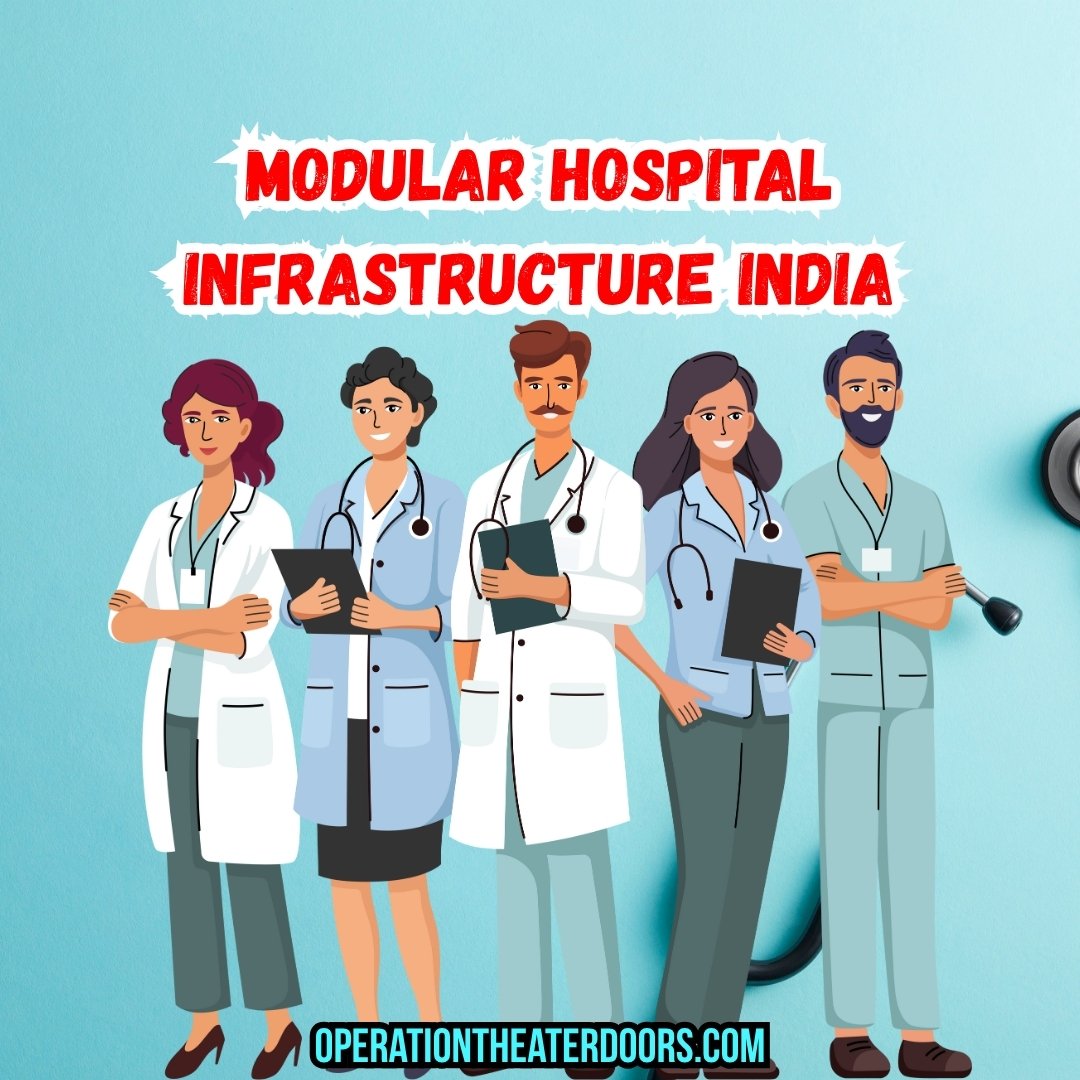
Picture this: a team of surgeons focused on a life-saving operation, only for unseen bacteria to slip through a poorly sealed door and turn the procedure into a battle against infection. Situations like these happen more often than we think in hospitals across India, where maintaining a sterile environment is the difference between success and complication. That’s where modular Operation Theater Doors come into play. These specialized doors, often designed as Hermetical Doors or PUF Insulated Doors, create airtight barriers that keep contaminants out and ensure surgeries stay infection-free. As a leading Operation Theater Door Manufacturer in Ahmedabad, Gujarat, we see firsthand how these doors transform hospital infrastructure, supporting everything from routine procedures to complex ICU Setups.
Hospitals today face constant pressure to uphold high standards of hygiene, especially in operation theaters where even a tiny lapse can lead to surgical site infections. Modular OT doors address this head-on by integrating seamlessly with Cleanroom Solutions and HVAC systems. They not only block airborne particles but also maintain controlled pressure and temperature, which is vital for patient safety. In places like Gujarat, where healthcare facilities are expanding rapidly, choosing the right Hospital Door or Cleanroom Door can make all the difference. Let’s explore why these doors are indispensable and how they fit into broader healthcare needs.
What Are Modular OT Doors and Why Do They Matter?
Modular Operation Theater Doors represent a shift from traditional setups to flexible, high-performance systems tailored for modern surgeries. Unlike standard doors, these are built with prefabricated components that allow quick assembly and customization. You can adjust them for size, material, and functionality, making them ideal for hospitals upgrading their facilities without major disruptions.
At their core, these doors focus on infection control. They seal off the operation theater from external corridors, preventing cross-contamination. For instance, in a busy hospital, staff move in and out frequently, but a modular OT door minimizes air exchange during these transitions. This helps maintain positive pressure inside the theater, pushing clean air out and keeping dirty air from entering. Hospitals that adopt these doors often report fewer postoperative infections, which directly improves patient outcomes.
Beyond basics, modular designs incorporate advanced materials like stainless steel frames and PUF Panels for insulation. These elements resist moisture and microbial growth, ensuring longevity even in humid climates like Gujarat’s. When you pair them with HEPA Filtration systems, the result is a controlled environment that meets stringent standards. Administrators appreciate this because it simplifies compliance during audits.
Consider how these doors integrate with Turnkey Projects. In a new hospital build, you can install modular OT doors as part of a complete package, including walls and ceilings. This approach saves time and reduces costs compared to piecemeal construction. For more on how we handle such integrations, check out our Turnkey Projects. And according to the WHO guidelines for preventing surgical site infections, maintaining such barriers is key to reducing infection risks.
The Role of Operation Theater Doors in Infection Prevention
Operation Theater Doors act as the first line of defense against infections in surgical settings. They block pathogens, dust, and other contaminants that could compromise sterile fields. In an operation theater, air quality is paramount, and these doors ensure that only filtered air circulates. By creating a hermetic seal, they prevent pressure drops that might allow bacteria to infiltrate.
Think about the mechanics: when a door opens, it can introduce up to 1,000 colony-forming units of bacteria per minute if not properly designed. Modular OT doors counter this with automatic sensors or foot-operated mechanisms that limit contact and speed up closure. This is especially useful in high-traffic areas like surgical units in large hospitals.
In addition, these doors support NABH/GMP/WHO Compliance by incorporating features like antimicrobial coatings. Hospitals aiming for accreditation must demonstrate robust infection control, and OT doors play a central role. For example, during NABH audits, inspectors check for airtight seals and easy-to-clean surfaces. Facilities that invest in quality doors pass these checks with ease.
We often recommend these for Pharma Doors in manufacturing units too, where similar sterility is needed. Explore our range of Operation Theatre Doors to see options suited for various setups. The Indian government’s guidelines emphasize such measures in hospital design, as outlined in the National Guidelines for Infection Prevention and Control.
Key Features of Hermetical Doors for Surgical Environments
Hermetical Doors stand out for their ability to form a complete seal, making them perfect for operation theaters. These doors use gaskets and specialized tracks that compress upon closing, eliminating gaps where air or microbes could pass. This feature is crucial in maintaining differential pressure, often set at 15-20 Pascals higher inside the OT.
One standout aspect is their durability. Built with materials like aluminum alloys or stainless steel, they withstand frequent use without warping. Many models include vision panels made of tempered glass, allowing staff to monitor activities without opening the door. This reduces unnecessary entries and preserves sterility.
For ICUs, Hermetical Doors often come with sliding mechanisms for smooth operation, even in tight spaces. They integrate well with HVAC systems, ensuring consistent temperature and humidity. In cleanrooms, this prevents condensation that could harbor bacteria.
Contractors value the ease of installation in Modular OT Setups. These doors can be retrofitted into existing frames, minimizing downtime. If you’re planning a project, our Modular Operation Theatres page details how we customize them. NABH standards highlight the importance of such seals in OT design, as seen in their accreditation guidelines.
Advantages of PUF Insulated Doors in Hospital and Cleanroom Settings
PUF Insulated Doors bring thermal efficiency to the forefront, which is essential for maintaining stable environments in hospitals. Polyurethane foam (PUF) cores provide excellent insulation, reducing energy loss and keeping temperatures steady. In an OT, this means fewer fluctuations that could affect equipment or patient comfort.
These doors also excel in soundproofing, creating quieter spaces for focused surgeries. Their lightweight yet robust construction makes them easy to operate, even manually. For cleanrooms, PUF Panels in doors minimize particle accumulation, supporting GMP compliance.
In ICUs, where patients need controlled climates, these doors prevent heat transfer from corridors. They resist corrosion and are easy to sanitize, ideal for frequent cleaning protocols. Pharma units use them for storage areas to protect sensitive materials.
As a Manufacturer of PUF Panel Doors, we ensure our products meet industry needs. Learn more about our PUF Insulated Doors. WHO recommends insulated barriers in infection-prone areas to enhance control measures.
Ensuring Compliance with NABH, GMP, and WHO Standards Through OT Doors
Compliance isn’t just paperwork; it’s about building trust in healthcare delivery. NABH/GMP/WHO Compliance requires hospitals to implement systems that prevent infections, and OT doors are integral. Modular designs help by offering verifiable features like airtight seals and HEPA-compatible integrations.
Under NABH, OTs must have doors that support zoning—separating sterile from non-sterile areas. GMP for pharma extends this to production lines, where Cleanroom Flush Doors prevent cross-contamination. WHO focuses on global best practices, urging facilities to use barriers that reduce surgical site infections.
Hospitals in India often struggle with outdated infrastructure, but upgrading to compliant doors bridges that gap. These doors facilitate audits by providing documentation on materials and testing. For diagnostic labs, they ensure accuracy in controlled environments.
Our Cleanroom Solutions align with these standards seamlessly. The Ministry of Health’s infection control guidelines reinforce the need for such doors in Indian hospitals.
Integrating OT Doors with ICU Setup and Cleanroom Solutions
A well-integrated system turns individual components into a cohesive unit. OT doors work hand-in-hand with ICU Setup, where seamless transitions between theaters and recovery areas matter. Sliding Hermetical Doors allow quick patient transfers without compromising air quality.
In Cleanroom Solutions, these doors form part of modular walls, ensuring uniform contamination control. HVAC integration is key; doors with sensors adjust airflow dynamically. For Turnkey Projects, this means delivering ready-to-use spaces.
Pharma QA teams benefit from doors that maintain ISO-class environments. In electronics labs, they protect against static and dust. Hospitals combining OT and ICU doors see improved workflow efficiency.
Discover how we serve these needs in Hospitals & Surgical Centres. NABH checklists stress integrated infection control in OTs.
Benefits for Specialized Facilities Like Pharma Units and Diagnostic Labs
Specialized facilities have unique demands, and modular OT doors adapt well. In pharma, Pharma Doors prevent batch contamination during manufacturing. Their hermetic seals align with GMP, protecting sterile processes.
Diagnostic labs use Cleanroom Doors to safeguard samples from environmental interference. IVF centres rely on them for temperature-sensitive embryo handling. Even F&B plants adopt similar doors for hygiene in processing areas.
Contractors handling Turnkey Projects appreciate the versatility. These doors reduce installation time, allowing faster project completion. Plant managers in cosmetics or R&D labs value the low maintenance.
For more industry applications, visit our Industries We Serve. WHO’s surgical infection guidelines apply broadly to these controlled spaces.
Installation and Maintenance Best Practices for Long-Term Performance
Proper installation sets the foundation for reliable performance. Start with site assessments to ensure doors fit existing frames. Use certified technicians to align seals and test pressure differentials.
Maintenance involves regular checks: inspect gaskets quarterly, clean surfaces daily, and lubricate mechanisms as needed. This prevents breakdowns during critical times. Hospitals should train staff on operation to avoid misuse.
For Fire Exit Doors in OTs, ensure compliance with safety codes alongside infection control. In Gujarat’s varying weather, choose doors resistant to humidity.
Our Resources offer guides on these practices. Indian ICMR guidelines on hospital infection control recommend routine door maintenance.
Why Operation Theater Door Manufacturers in Ahmedabad Lead the Way
Ahmedabad, as a hub for healthcare innovation in Gujarat, hosts manufacturers who specialize in tailored solutions. An Operation Theater Door Manufacturer in Ahmedabad understands local needs, from NABH-compliant designs to cost-effective Turnkey Projects.
Gujarat’s growing pharma and hospital sectors drive demand for quality ICU Door Manufacturers in Gujarat. Facilities here benefit from proximity to suppliers, ensuring quick deliveries and support. For instance, hospitals in Ahmedabad often upgrade to PUF Insulated Doors to handle the region’s climate.
Architects and contractors in Gujarat prefer local manufacturers for customized Cleanroom Solutions. This reduces logistics issues and supports economic growth. If you’re in the area, partnering with an ICU Door Manufacturer in Gujarat streamlines your projects.
Explore our About Us to see our commitment to excellence. The Ministry of Health promotes regional manufacturing for better healthcare access.
Frequently Asked Questions
What makes Hermetical Doors suitable for operation theaters?
Hermetical Doors provide an airtight seal that prevents air leakage, crucial for maintaining positive pressure in OTs. They reduce the risk of airborne contaminants entering during surgeries. Hospitals use them to comply with NABH/GMP/WHO Compliance, ensuring safer procedures.
How do PUF Insulated Doors help in ICU Setups?
PUF Insulated Doors offer superior thermal insulation, keeping ICU environments stable and energy-efficient. They minimize noise and support HEPA Filtration by preventing drafts. As a result, patients experience better recovery conditions in controlled spaces.
What should I look for in an Operation Theater Door Manufacturer?
Choose a manufacturer with experience in Modular OT Setups and Cleanroom Solutions. They should offer customizable options like Emergency Exit Doors integrated with fire safety features. Reliability in Ahmedabad or Gujarat ensures timely service and compliance support.
Are Cleanroom Flush Doors necessary for pharma units?
Yes, Cleanroom Flush Doors eliminate crevices where dust accumulates, supporting GMP standards. They integrate with HVAC systems for consistent air quality. Pharma QA teams rely on them to protect product integrity during manufacturing.
How do modular OT doors contribute to infection-free surgeries?
Modular OT doors create barriers against pathogens, maintaining sterility through hermetic seals and insulation. They work with Turnkey Projects to build efficient systems. This directly lowers surgical site infection rates, as per global guidelines.
What role do Fire Exit Doors play in hospital safety?
Fire Exit Doors provide quick evacuation routes while maintaining infection control in non-emergency times. They often include PUF Panels for insulation and comply with safety norms. Hospitals balance them with regular Hospital Doors for comprehensive protection.
Can ICU Doors be customized for specific hospital needs?
Absolutely, ICU Doors can be tailored for size, automation, and materials like stainless steel. This customization supports ICU Setup in facilities across Gujarat. It ensures seamless integration with monitoring equipment.
How often should OT doors be maintained for optimal performance?
Maintain OT doors quarterly for seals and mechanisms, with daily cleaning. This prevents failures and upholds NABH standards. Regular checks by an ICU Door Manufacturer extend lifespan.
What are the benefits of using PUF Panels in Cleanroom Doors?
PUF Panels enhance insulation, reduce energy costs, and resist microbial growth in Cleanroom Doors. They support Pharma Doors in maintaining controlled environments. This is vital for labs and surgical units.
Final Thoughts
Modular OT doors go beyond mere entryways; they safeguard lives by enabling infection-free surgeries through smart design and integration. From Hermetical Doors sealing off contaminants to PUF Insulated Doors stabilizing environments, these elements elevate hospital standards. Whether you’re managing a surgical centre, pharma unit, or diagnostic lab, investing in quality doors pays off in safety and efficiency.
If your facility needs upgrades, reach out to a trusted provider for Operation Theater Doors or Cleanroom Solutions. For comprehensive turnkey support, consider AUM Industries as your partner. Contact us at amit@aumindustriesmfg.com or +91-9274313580 to discuss how we can help. Located at World Trade Tower, A-617, Sarkhej – Gandhinagar Hwy, Makarba, Ahmedabad, Gujarat 380051, India, we’re here to build safer spaces together.






